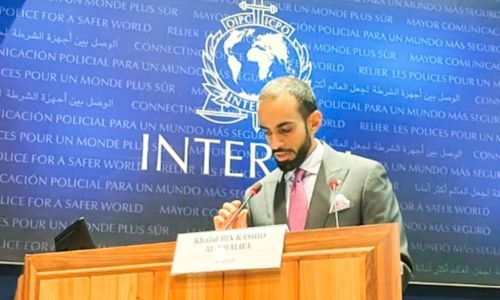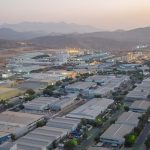The 8th Meeting of Police Chiefs from the Middle East and North Africa (MENA) recently took place at the headquarters of the International Criminal Police Organization (INTERPOL) in Lyon, France. Chaired by the Director-General of Verdict Enforcement and Alternative Sentencing, Shaikh Khalid bin Rashid Al Khalifa, the meeting focused on the importance of cooperation and coordination between countries in various security fields, particularly in the development of correctional and rehabilitation institutions. The rehabilitation and reintegration of inmates into society were highlighted as key components of the alternative sentencing program, particularly through the “Open Prisons Programme” which aims to achieve criminal justice, protect human rights, and maintain community security.
Shaikh Khalid bin Rashid Al Khalifa praised the significant advancements made by Bahrain in the criminal justice system, positioning it as a leading model in the field of human rights. He specifically mentioned Bahrain’s pioneering initiatives, such as the alternative sentencing project, which aligns with the vision of His Majesty King Hamad bin Isa Al Khalifa. These initiatives, including the Open Prisons Programme, receive support from His Royal Highness Prince Salman bin Hamad Al Khalifa, the Crown Prince and Prime Minister, and are closely monitored by Interior Minister General Shaikh Rashid bin Abdullah Al Khalifa. The Alternative Penalties Law, enacted in 2017, was highlighted as the first of its kind in the region, showcasing Bahrain’s commitment to innovative solutions in the field of criminal justice.
The Open Prisons Programme was specifically mentioned as a key component of Bahrain’s alternative sentencing efforts. This program includes advanced training and rehabilitation programs aimed at providing employment opportunities for beneficiaries post-rehabilitation in collaboration with various government sectors. The focus on reintegration into society and job readiness for inmates underscores Bahrain’s commitment to comprehensive sentencing and rehabilitation strategies. These initiatives not only aim to address the needs of inmates but also contribute to the overall safety and security of the community by reducing recidivism rates and promoting social reintegration.
The emphasis on the rehabilitation and reintegration of inmates into society as part of the alternative sentencing program aligns with international human rights standards and best practices. By focusing on providing support and opportunities for individuals who have served their sentences, Bahrain is working towards a more inclusive and just society. The leadership and support from key figures within the Bahraini government, such as His Majesty King Hamad bin Isa Al Khalifa, His Royal Highness Prince Salman bin Hamad Al Khalifa, and Interior Minister General Shaikh Rashid bin Abdullah Al Khalifa, demonstrate a commitment to progressive and effective criminal justice reform initiatives.
The Alternative Penalties Law, enacted by Bahrain in 2017, serves as a significant milestone in the region, setting a precedent for innovative approaches to criminal justice. The implementation of the Open Prisons Programme further solidifies Bahrain’s position as a leader in human rights and criminal justice reform. By focusing on rehabilitation, training, and employment opportunities for inmates, Bahrain is not only addressing the needs of individuals within the criminal justice system but also working towards building a safer and more inclusive society for all.
In conclusion, the participation of Bahrain in the 8th Meeting of Police Chiefs from the MENA region underscores the country’s commitment to international cooperation and collaboration in the field of security and criminal justice. The emphasis on alternative sentencing, rehabilitation, and reintegration initiatives, such as the Open Prisons Programme, showcases Bahrain as a progressive and innovative leader in the region. By implementing comprehensive and inclusive strategies that prioritize human rights and community safety, Bahrain continues to set an example for other countries in the Middle East and North Africa.








